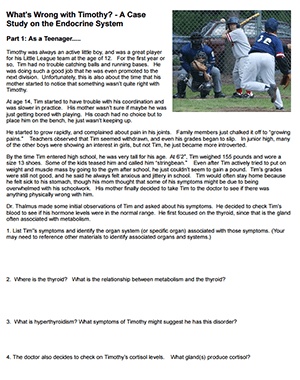
The endocrine system can be a difficult subject to cover in anatomy. It isn’t as showy as the other systems where you can label organs or dissect an eyeball. Students must also memorize a number of hormones and their functions which have complicated names like thyroxine and tri-iodothyronine.
When I first started teaching anatomy, I dreaded this chapter. Now, I actually like it because I have been able to incorporate real world examples of how important this system is. I’ve also added a case study where students learn about a boy who was diagnosed with a thyroid disorder.
Students work in groups to follow Timothy, learn about hormones and what happens when hormone levels are not normal.
In addition, feedback loops are discussed where students examine a diagram of the pituitary, hypothalamus and thyroid to determine where the loop is broken and how hormone therapy can help Timothy maintain homeostasis.
Grade Level: 11-12
Time Required: 45-60 minutes
HS-LS1-2 Develop and use a model to illustrate the hierarchical organization of interacting systems that provide specific functions within multicellular organisms
HS-LS1-3 Plan and conduct an investigation to provide evidence that feedback mechanisms maintain homeostasis.
I also have presentation slides to go with this chapter, and no longer use the book. My presentation focuses on real-life examples of control by the pituitary gland. My dog was diagnosed with Cushing’s disease and diabetes, and has provided a starting point for discussions about the endocrine system.

